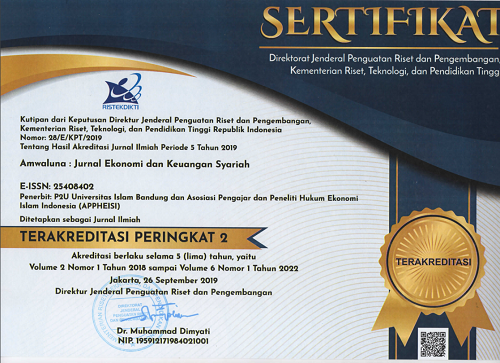PERFORMANCE ANALYSIS OF SHARIA SHARE COMPANIES USING THE PIOTROSKI F-SCORE METHOD
Abstract
Indonesia is a region that has the largest Muslim population in the world. It is a promising market opportunity to develop the Indonesian Islamic capital market. This study aims to analyze public company performance in determining the quality of sharia stocks. This study used the secondary data in historical data, namely the annual financial statements in 2017 and 2018. Meanwhile, the sample used in this study is 30 sharia stock issuers registered in the Jakarta Islamic Index. The analytical method used is the Piotroski F-Score. The study results found that there are four sharia stocks with perfect financial conditions, twenty five sharia stocks with moderate financial conditions, and one sharia stock whose financial conditions were relatively weak. This study also shows that the Piotroski F-Score method can identify Islamic stocks’ quality in the Indonesian capital market
Keywords
Full Text:
PDFReferences
Asmadi, D., Syairudin, B., & Widodo, E. (2015). Kontribusi Kecerdasan Emosional dan Kecerdasan Spiritual Terhadap Kinerja Karyawan yang dimoderasi Kepemimpinan Transformasional. Prosiding Seminar Nasional Manajemen Teknologi XXII, 1–10.
Cho, S.-S., Shin, J.-S., & Byun, J. (2012). The Value of a Two-Dimensional Value Investment Strategy: Evidence from the Korean Stock Market. Emerging Markets Finance and Trade, 48(sup2), 58–81. https://doi.org/10.2753/ree1540-496x48s204
Dewandaru, G., Masih, R., Bacha, O. I., & Masih, A. M. M. (2015). Combining momentum, value, and quality for the Islamic equity portfolio: Multi-style rotation strategies using augmented Black Litterman factor model. Pacific Basin Finance Journal, 34, 205–232. https://doi.org/10.1016/j.pacfin.2014.12.006
Hartanto, D. P. (2014). Penilaian Kelayakan Investasi Pada Saham-Saham Sektor Industri Kontruksi dan Bangunan yang Terdaftar di Bursa Efek Indonesia (BEI). Universitas Lampung.
Hyde, C. E. (2013). An Emerging Markets Analysis of the Piotroski F Score. Ssrn, 1–19. https://doi.org/10.2139/ssrn.2274516
Hyde, C. E. (2018). The Piotroski F-score: evidence from Australia. Accounting and Finance, 58(2), 423–444. https://doi.org/10.1111/acfi.12216
IDX. (2019a). Pengumuman Evaluasi Berkala Jakarta Islamic Index (JII). Idx.
IDX. (2019b). PT Bursa Efek Indonesia. Idx. https://www.idx.co.id/idx-syariah/produk-syariah/
Krauss, C., Krüger, T., & Beerstecher, D. (2015). The Piotroski F-Score: A fundamental value strategy revisited from an investor’s perspective. https://www.econstor.eu/handle/10419/121238
Mohr, J.-H. M. (2012). Utility of Piotroski F-Score for predicting growth-stock returns. In Working Paper, MFIE Capital.
Novy-marx, R. (2012). Quality Investing. Working Paper. https://pdfs.semanticscholar.org/9480/0c35aff62f304d42ac8a9112cd9f40d8e59f.pdf
Piotroski, J. D. (2000). Value Investing: The Use of Historical Financial Statement Information to Separate Winner from Losers. Accounting Research, 38, 1–41.
Puspitasari, S., Mahri, A. J. W., & Utami, S. A. (2020). Indeks Inklusi Keuangan Syariah di Indonesia. Amwaluna: Jurnal Ekonomi Dan Keuangan Syariah, 4(1), 15–31. https://doi.org/10.29313/amwaluna.v4i1.5094
Singh, J., & Kaur, K. (2015). Adding value to value stocks in Indian stock market: an empirical analysis. International Journal of Law and Management, 57(6), 621–636. https://doi.org/10.1108/IJLMA-09-2014-0055
Sugiyono. (2011). Metode Penelitian Kuantitatif, kualitatif dan R&D. Alfabeta.
Yovita, F. V. (2017). Pengujian Kefektifan Metode Piotroski F-Score Analysis Dalam Menilai Kelayakan Investasi Saham (Studi Kasus Pada Perusahaan yang Tergabung dalam Indeks LQ45 dan Terdaftar di BEI Periode 2013-2015). Universitas Gajah Mada.
Zulfikar, R., & Mayvita, P. A. (2018). The Effects of Political Events Against Abnormal Return and Total Volume Sharia Shares Activity That Listed in Jakarta Islamic Index (JII). JEMA: Jurnal Ilmiah Bidang Akuntansi Dan Manajemen, 14(02), 157. https://doi.org/10.31106/jema.v14i02.511
DOI: https://doi.org/10.29313/amwaluna.v5i1.5926
Refbacks
- There are currently no refbacks.
Editorial Office:
Syariah Faculty, Universitas Islam Bandung
Jalan Tamansari No. 24-26 Kota Bandung

Amwaluna : Jurnal Ekonomi dan Keuangan Syariah is licensed under a Creative Commons Attribution-NonCommercial-ShareAlike 4.0 International License.








